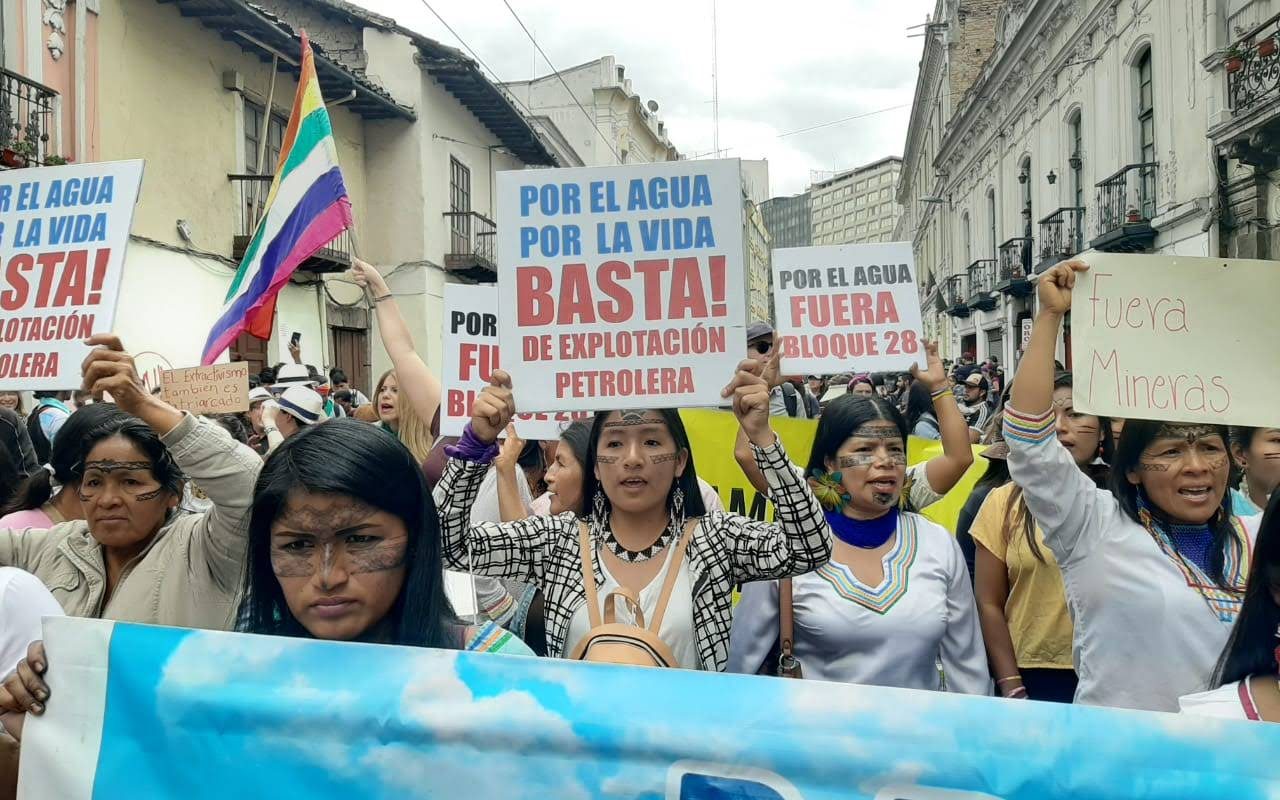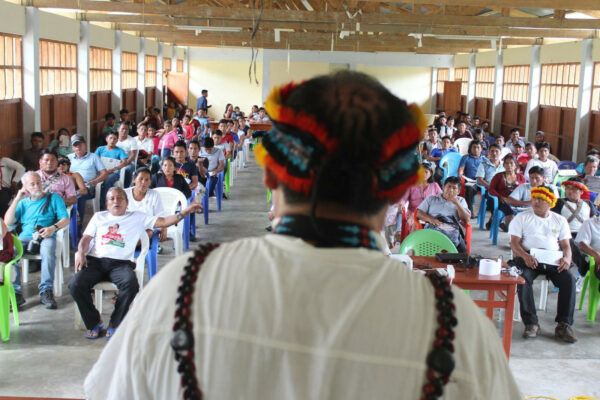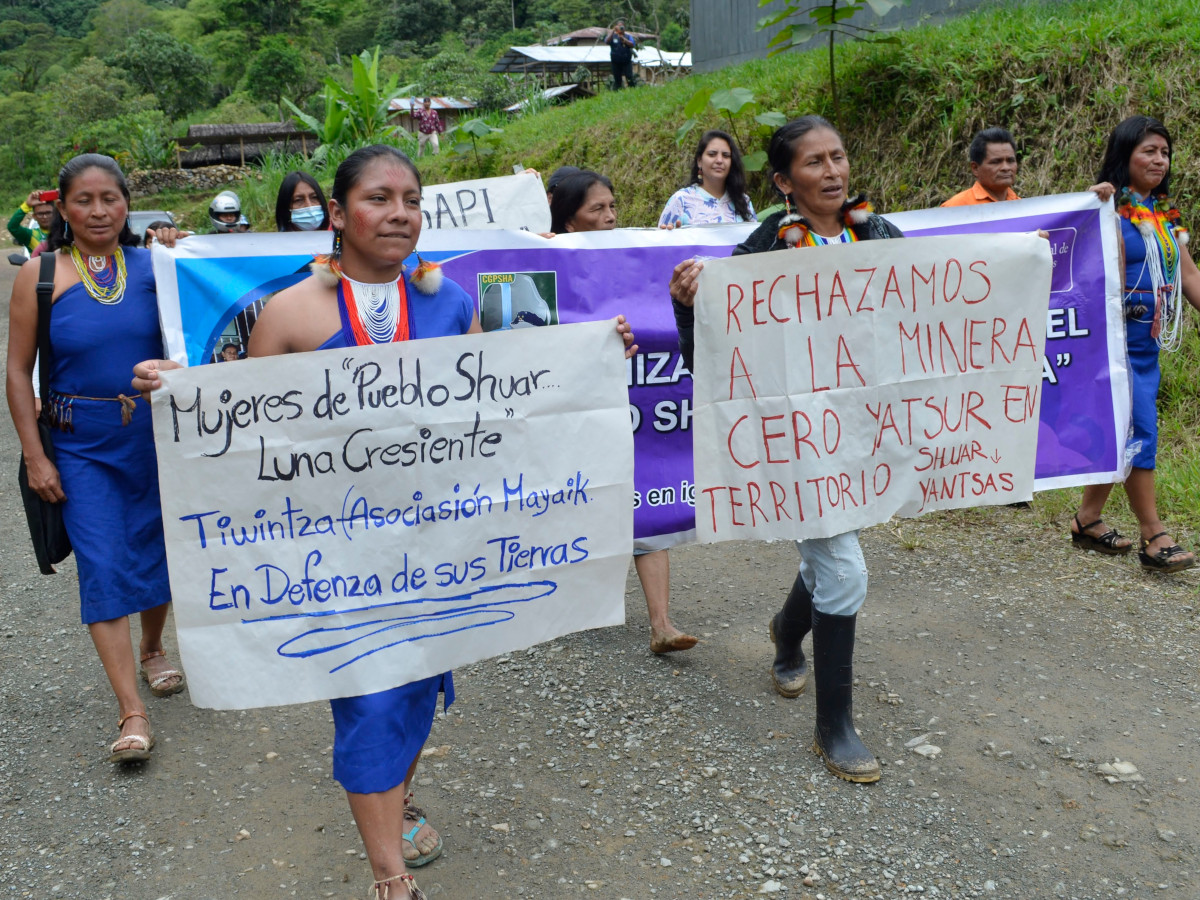Eight months after the COVID-19 crisis and the subsequent collapse of the energy market crippled Ecuador’s economy, the country is pinning its post-pandemic recovery hopes on expanding oil and mining extraction in the Amazon.
Desperate to build investor confidence, legislators are working to draft a bill on the Free, Prior, and Informed Consultation, not the UN Declaration on the Rights of Indigenous Peoples (UNDRIP) standard of Free, Prior and Informed Consent (FPIC), of Indigenous peoples. They hope to signal that Indigenous opposition, protests, and legal challenges that have halted projects in recent years are a thing of the past.
But legislators, either unclear on the concept or willfully ignorant, failed to consult with Indigenous peoples in discussions and preparation of a draft bill. It also fails to include the right to consent – the internationally accepted standard that acknowledges Indigenous peoples’ autonomy to accept or veto any project or policy that affects them.
Declaring, “Our rights! Our territories! Our decision!,” leaders from Ecuador’s regional Amazonian Indigenous confederation CONFENIAE denounced the proposed bill today at a press conference in the Amazon city of Coca.
“We demand that an FPIC law be put forth in harmony with and respect for our peoples and nations and our ways and time frames for discussion, analysis, and decision-making. We are not going to acquiesce to an illegitimate law written from their desks in Quito,” said a CONFENIAE statement. “Since this will be a law regarding the collective rights of Indigenous peoples and nations, we ourselves must be the ones who put forth and define that law. Any law that sidesteps dialogue with us will not be valid and will not be enforceable in the territories of the Indigenous peoples and nations.”
According to Ecuador’s constitution, the government maintains all subsurface mineral rights. So while Indigenous peoples may have land titles, it is only from the ground up. The 2008 constitution enshrines the right to Free, Prior, and Informed Consultation, but not consent, which is contrary to the international standard outlined in the UNDRIP. Even so, Ecuador never enacted law to govern how the consultation process should take place, setting the stage for conflicts with local communities and legal challenges.
A country visit by UN Special Rapporteur on Indigenous Rights Victoria Tauli-Corpuz in 2018 found that “so-called development projects have violated and continue to violate their fundamental rights” and that the exclusion of Indigenous peoples from national development plans made Indigenous rights “invisible.” The Rapporteur also determined that there were “no adequate enabling mechanisms or processes which allow Indigenous peoples to exercise [the] right” to FPIC. The country was ordered to enact the necessary law or procedure in 2013 by the Inter-American Court of Human Rights in the ground-breaking Sarayaku v. Ecuador case, but has failed to do so.
This means that the dozens of oil and mining concessions carved out of Indigenous territories in the Amazon and handed over to companies over the last decades were awarded in absence of any meaningful process of FPIC. Multiple cases have been brought in recent years that challenged violations of these rights.
By moving a weak bill forward, the government is also trying to end-run its own judicial system, hoping to head off decisions in several cases that would create a strong precedent for Indigenous rights. Three cases are currently pending before the country’s progressive Constitutional Court that would establish national jurisprudence on FPIC, possibly including a definition of consultation that includes consent.
According to Ecuador’s constitution, Indigenous peoples must be consulted on any law that affects their rights and territories. There can be no constitutional FPIC law without consultation with and consent from Indigenous peoples. Leaving the very people that the bill is supposedly meant to address out of the process underscores how little legislators understand about their own constitutional obligations.
The fact that the government can’t get this right is a warning sign to investors of the trouble that lies ahead for their projects. Companies should not be fooled. This is not a social license to operate and will only exacerbate tensions.
CONFENIAE leaders in the press conference demanded the right to consent on any law and called on the Constitutional Court to convene hearings by the end of the year and publish a ruling ahead of any process to draft the law.
According to CONFENIAE President Marlon Vargas, some Indigenous peoples have already concluded they don’t even want to be consulted on extractive projects, much less grant consent. “They’re saying ‘We’ve already decided. We’ve seen the destruction that oil and mining activities have on our forests, our rivers, our health, and our culture. Why would we want that? We’re not interested in more talking or process. No means no. We are exercising our right to self-determination and autonomy. We decide what happens in our territory.'”
An expansion of the extractive industry on Indigenous territories in Ecuador is a recipe for conflict and ecological disaster, particularly if the projects move forward without consultation and consent of local communities. Indigenous peoples have been historically denied the right to decide what happens on their territories and the right to participate in the laws that affect their lives, lands, and cultures. Decisions made in distant capitals without them have brought the Amazon Basin to an ecological tipping point and threaten the lives of those that dare to speak out and exert their rights.
Ecuador needs a law on the consultation and consent of Indigenous peoples that comes from Indigenous peoples – a law whose construction reflects the very process it is meant to enshrine.














